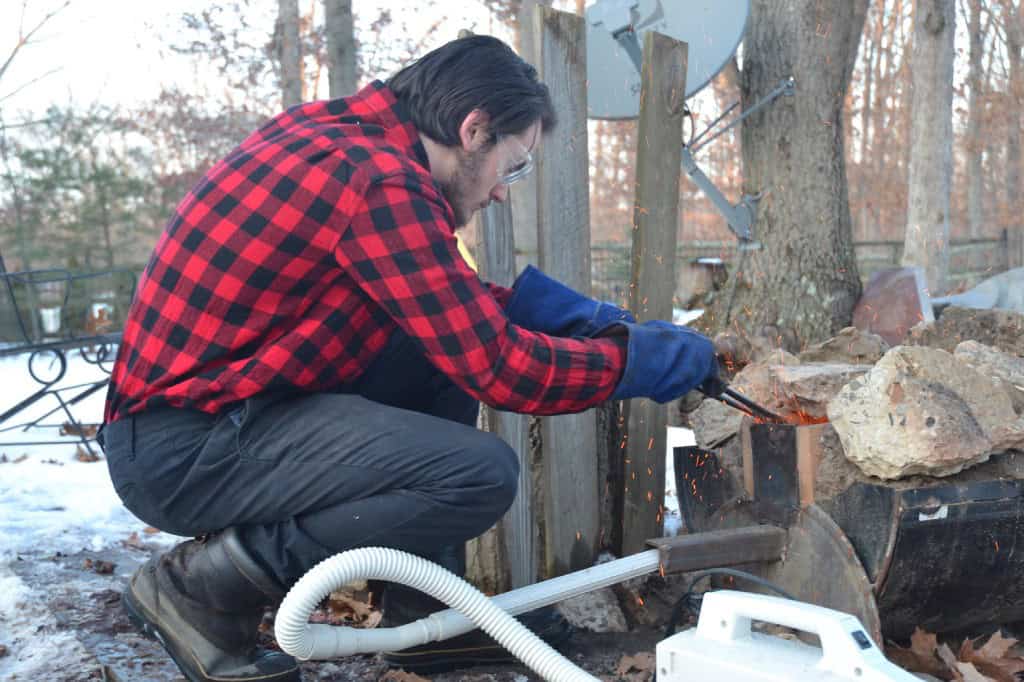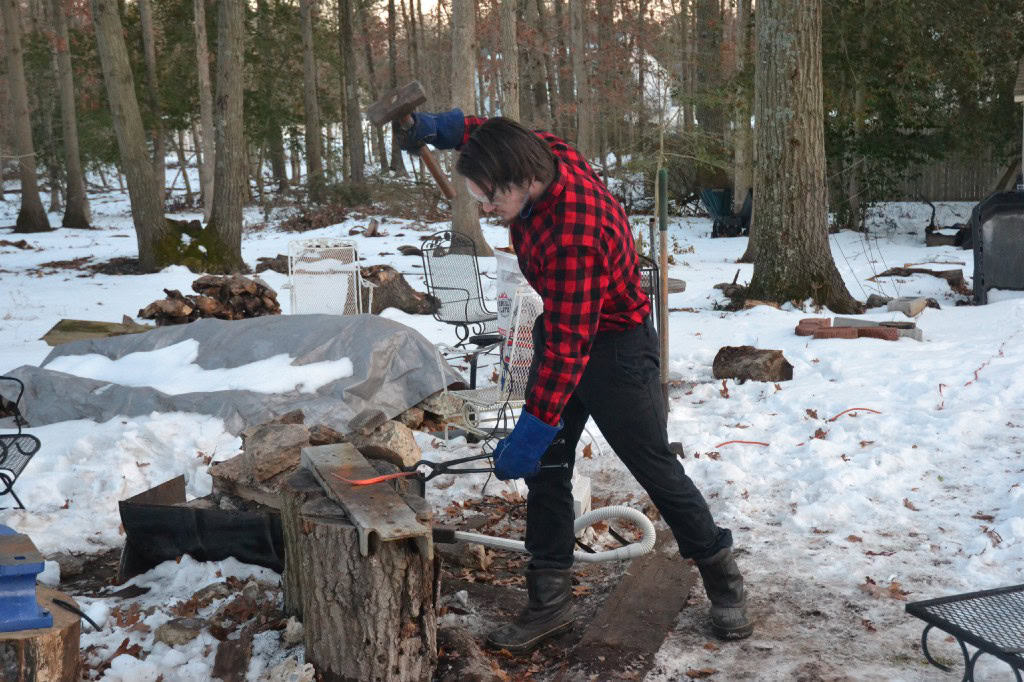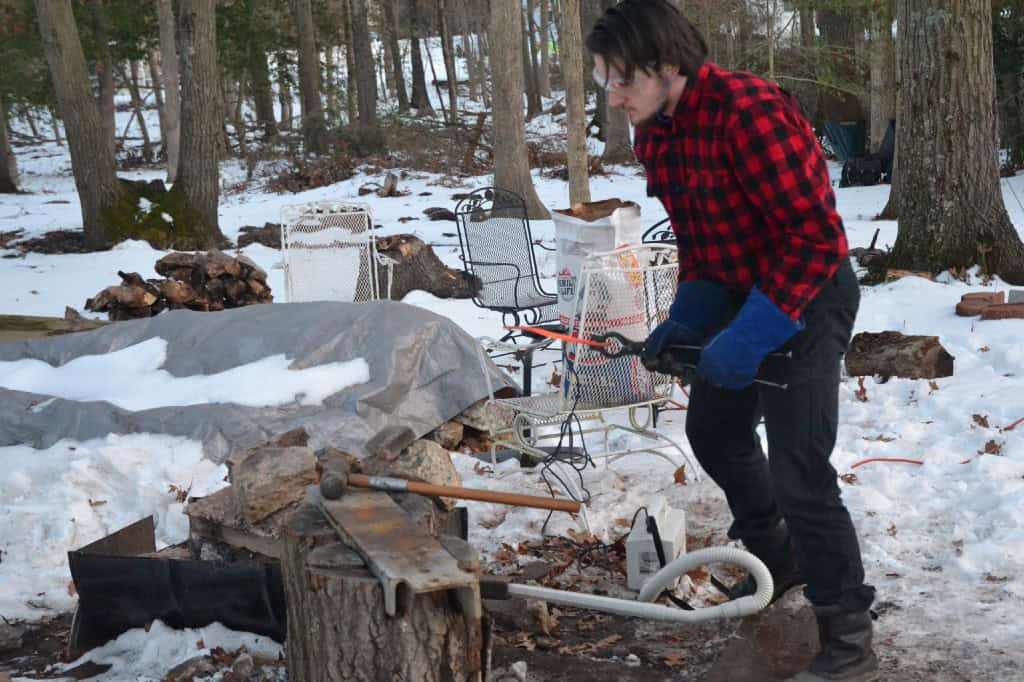
Addison Lee created a blacksmith’s forge in the backyard of his Shamong home where he makes knives using heat and a few simple tools.

For Seneca High School senior Addison Lee, life has always centered around the outdoors. His childhood was spent in the woods bordering his Shamong home, and he said it wasn’t unusual to see him or his friends walking around with an ax ready to cut down a few trees to build a fort.
“Life was always more about occupation in the outdoors than it was indoors,” Lee said.
Lee said as far back as he can remember, he’s had a desire to build and create. In sixth grade, Lee developed a fascination with metal working, but it took a woodworking class his freshman year to spark the realization that if he had the passion, he could learn the skills. Today, Lee works as a blacksmith creating knives in the backyard of his Shamong home.
The first step toward having a blacksmith’s forge in his backyard took place when Lee was in sixth grade. He said he used to watch YouTube videos of people melting aluminum and pouring it into a mold. He said the smiths in these videos were heating with the aluminum 55-gallon barrel, so he decided he needed one, too. He raised a $130, bought a 55-gallon barrel and it sat in his backyard until he turned 17.
Lee said he knew then he wanted to cast knives, but as a sixth grader, he didn’t think anyone would take his work seriously. He also worried about not having the resources, physical ability or technique, and so, discouraged, he put the idea aside for a time.

His freshman year at Seneca, Lee took a woodworking class that changed his perspective and revived his interest. He said the course taught him that even if he didn’t have the natural abilities, as long as he had the passion, he could learn.
The class set the idea in motion, so Lee took to “the school of YouTube” and began voraciously studying how to cast knives. He said he was especially inspired by a blacksmith from the United Kingdom who dropped out of school to become a blacksmith, and by the age of 19, the smith had his own warehouse. At the age of 17, Lee decided if someone who was only two years older than him could have an entire warehouse, he had no excuse not to try.
He tested the waters by digging a simple hole in the ground, and he lined it with stones. He dug a second hole for airflow, added in charcoal and created his first knife in two days over the flames.
From there, Lee decided to incorporate some more equipment into the mix. So, he took the barrel that had been sitting dormant in his backyard and cut it in half to create a charcoal forge.
When using a charcoal forge, the flame has to be moving in the same direction as the steel, so he fed a square metal tube into the barrel and attached the exhaust port of a vacuum cleaner that had been sitting in his house. He said the vacuum blows air into holes he drilled along the tube and gets the flames moving. If all goes well, his forge produces flames that burn between 1,500 and 1,700 degrees fahrenheit.

For materials, Lee uses spare rebar that has been in his backyard for as far back as he can remember. He said he heats and pounds out the metal into flat sheets before carving out the shape of his knives. He said much of his work takes place at a low grit belt sander, which takes off the excess material and grinds the metal into shape. After, Lee returns to the forge where he heats the steel to a critical temperature and pounds it once more.
Then, in a process known as quenching, Lee dunks the steel into ice water to once again harden the steel. From there, he can sharpen the blade and add wood to create the handle.
His first knife is the only one he has kept. Through word of mouth, Lee has sold his pieces to family and friends, with prices ranging from $140 to $60 depending on size. While he enjoys creating and selling the pieces, Lee isn’t looking to turn his knives into a major business. His sales provide him with gas money and cover the occasional expense, but for Lee, casting knives is a passion.
“It’s a lot of just the satisfaction of making something; it’s irreplaceable,” Lee said. “You can’t finish your homework and have the same feeling of accomplishment you do when you make something like this. This is just pure creativity.”
Lee said as a self-proclaimed overthinker, working with metal is one way to help quiet his mind. He said he finds the physicality of working as a blacksmith to be calming, and when he’s done, he has something to show for his efforts.
However, working with the flames and power tools is not without its dangers. Lee said he does his best to be safe — wearing safety goggles, earplugs and protective gloves while working, but he does have his fair share of battle wounds. He said he’s accidentally punctured himself more than a time or two during the learning process, but he’s never felt deterred by an injury.
“A lot of scars come with the business,” Lee said, glancing down to examine his hands.
Lee is in the process of applying to college. He said his plan is to study mechanical engineering, but he anticipates continuing to create knives in his spare time for the foreseeable future.
“To me, it’s just something if I spend too long without doing, I do miss it, and I miss it a lot,” Lee said, looking at his backyard forge with a smile.









